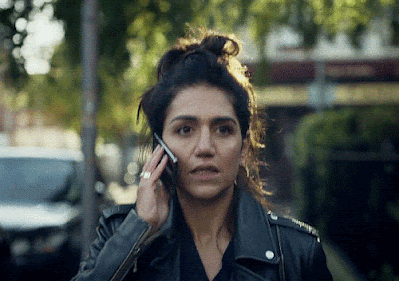Something terrible happened towards the end of last year. As a liberal hipster, my easily distracted
thumb was pottering around on the Guardian app and I came across an article
counting down the top
50 TV shows of 2020. Like you, I did
wonder for a moment why I hadn’t been asked to write it, but then realised I am
not actually a professional journalist.
But, as an amateur connoisseur of boxsets, I quickly clicked it and read
it, anxious to see whether I could nod in reassuring agreement or reel
dramatically at their choices. Naturally,
in first place we had I May Destroy You. Well done me; I had watched this. But, at number two, was I Hate Suzie. For shame, I had never found the promos of
this show appealing. I had in fact
ignored a friend’s recommendation to try it, even though he was the same rascal
that turned me on to my beloved Industry. With lockdown going on forever, I made my way
through its eight episodes on Sky Boxsets.
Billie Piper is as much a part of British culture as xenophobic newspaper headlines and voting in comedy prime ministers. A massive popstar when I was in secondary school, she purveyed pop songs so cheesy and catchy that we laughed derisively about how uncool she was. We were much cooler, being obscure, untalented children and all. Until recently, though, my household did contain a CD single of Honey To The Bee, an underrated subsequent release of hers that almost references my surname. It might still be around here somewhere. But, thanks to my own perception of her as a singer, I never engaged with any of her acting up till now. Secret Diary Of A Call Girl was a mainstay of pre-Love Island ITV2, but not of my viewing schedule. Yet my friend, and the Guardian write-up, promised something worth investigating. As a sufferer of FOMOIEOYCRL (fear of missing out in end-of-year cultural ranking lists), the completionist in me was prepared to embrace Billie and welcome a bit of Piper back into my life. Because I wanted to.
Our premise is eerily similar to Piper’s own real-life
trajectory. She plays Suzie Pickles, a
national sweetheart shot to fame on a reality TV singing show (hello X Factor) before transitioning into a TV
actress. She’s one of those people in
the magazines and on the gossip websites and just doing this now. Only the last thing she’s just done, putting
at risk her entire career, is suffer a leak of private, explicit photos to the
media. Sadly, the shots are not a solo performance
and her accompaniment comes in the form of an extramarital phallus, so there’s
all that to deal with as well. Each
whirlwind instalment focuses on a single one of the eight stages in Pickles’ response
to the trauma.
In the process, Piper and co-creator (and full writer) Lucy Prebble (as
previously collaborated with on Secret Diary Of A Call Girl) use the unfolding
disasters to provide deliciously inventive commentary on a huge number of our
daily staples: the treatment of women, motherhood, fame, disability,
loneliness, sexuality and so on. From
the audible diarrhoea-induing first discovery of the pics to a proliferation of
meltdowns, via awkward family events (the wedding of Pickles’ sister is
outrageous and universal at the same time), frustrated self-loving (for more or
less a whole episode) and the ripest sending-up of celebrity culture, Piper’s
performance is everything. The camera
often just gives us all that face and it becomes our anchor in the madness,
trapping us with Pickles in her nightmare.
Yet more intriguing is her agent and best friend, Naomi (Leila Farzad). The dynamics of their relationship creak
under years of irreconcilable imbalance until we scream at Naomi to respect
herself and prioritise her own needs.
Naomi gives one of the best ever shutdowns to casual, micro-aggressive
racism I have ever seen, but her wronging by men knows no end (that train journey). Pickles’ husband is himself human collateral
in the fallout. Daniel Ings (one of the
joys from W1A) is exasperated as Cob, eagerly
weaponizing their deaf son to his advantage yet less than keen to lose the
perks of having a famous wife. Even with
her success, it is he, as the man, who expects to be more important in
everything that happens.
I admit to lacking patience with some episodes, but I am learning to love this freewheeling style (as seen in I May Destroy You) where creativity and storytelling gang up not to care about what you’re expecting. By the final scene of the final episode, my sympathy for Suzie Pickles was at its peak. I had never hated her and I don’t know who did. Having it all is simply another thing to feel lonely in spite of, only it emphasises the unjustifiability of that loneliness, so you feel even lonelier. Does Suzie’s preoccupation with herself drive others away, or do they give up on her when she doesn’t give them what they think they need? I still can’t work it out.







No comments:
Post a Comment